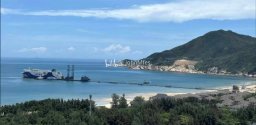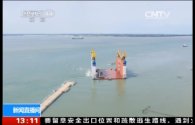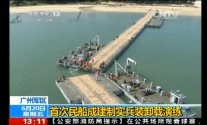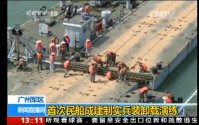I have always thought that the PLA will keep conducting tighter and tighter encirclement maneuvers in the future and, on the final day, catch Taiwan by surprise, do you think there will be a time lag between the PLA taking control of the islands around Taiwan and the PLA's official boarding of the islands for combat on that day?Penghu islands is a must to be taken in initial phase of AR. Magong 马公 is a small city of 60,000+ populations, it has an airport and seaport. It is also a ROC military outpost/naval base which can threaten PRC ships in Taiwan straits.
Islands on the East coast side (Lue Dao/ Green island, Lan Dao/ Orchid island, the islands off Su Ao ROC naval base and others) needs to be taken as well initially because you don't want ROC forces and infiltrators/Special forces from foreign countries to set up covert listening posts there.
A blockade on Taiwan island is not completed if these islands are not taken by PLA/PLAN.
You are using an out of date browser. It may not display this or other websites correctly.
You should upgrade or use an alternative browser.
You should upgrade or use an alternative browser.
PLA Strategy in a Taiwan Contingency
- Thread starter pugachev_diver
- Start date
In fact, the PLA has been using similar civilian ships for training for some years, now is just building more specialized ships. Western media tried to exaggerate the tension of the PLA's so-called sudden preparation for a war of unification, but the PLA always preparing for it since 1949.





Last edited:
lcloo
Major
I have always thought that the PLA will keep conducting tighter and tighter encirclement maneuvers in the future and, on the final day, catch Taiwan by surprise, do you think there will be a time lag between the PLA taking control of the islands around Taiwan and the PLA's official boarding of the islands for combat on that day?
My personal view, which could be very different from PLA planner's, is that it is very hard to execute surprise actions because
1) based on current PRC's stand, AR will only be carried out when Taiwan crossed the red line. And if Taiwan decides to declare independence, they would have well prepared in advance for any surprise.
2) Base on above, PLA's action would be blockade the island, cut off all sea and air traffics, execute psychological warfare until the general morale of civilian and military sink to the bottom, then only will they start bombardment to soften the ROC strength and thereafter air drop assaults and amphibious assaults will carry out.
3) PLA's taking over the out laying island probably carry out at the same time as the bombardment.
On the other hand, if PRC will to initiate AR without ROC breaching the red line first, they still need to hide movement of their navy ships, especially landing ships to keep element of surprise. Landing ships will need at least 3 or 4 hours or more to sail across the straits to their assigned beach and can be easily detected.
If there is any surprise, it would be sudden arrival of missiles and rockets on ROC positions, and parachute troops air drops from Y20 and Y9 as well as PLA army aviation helicopters dropping troops in targeted landing zones anywhere on the island. This is viable if the assaults are executed precisely as planned.
However, the risk is higher if ROC managed to keep their air defense from total destruction and able to shoot down transport aircraft of PLAAF and PLAGF.
Thank you for your reply.My personal view, which could be very different from PLA planner's, is that it is very hard to execute surprise actions because
1) based on current PRC's stand, AR will only be carried out when Taiwan crossed the red line. And if Taiwan decides to declare independence, they would have well prepared in advance for any surprise.
2) Base on above, PLA's action would be blockade the island, cut off all sea and air traffics, execute psychological warfare until the general morale of civilian and military sink to the bottom, then only will they start bombardment to soften the ROC strength and thereafter air drop assaults and amphibious assaults will carry out.
3) PLA's taking over the out laying island probably carry out at the same time as the bombardment.
On the other hand, if PRC will to initiate AR without ROC breaching the red line first, they still need to hide movement of their navy ships, especially landing ships to keep element of surprise. Landing ships will need at least 3 or 4 hours or more to sail across the straits to their assigned beach and can be easily detected.
If there is any surprise, it would be sudden arrival of missiles and rockets on ROC positions, and parachute troops air drops from Y20 and Y9 as well as PLA army aviation helicopters dropping troops in targeted landing zones anywhere on the island. This is viable if the assaults are executed precisely as planned.
However, the risk is higher if ROC managed to keep their air defense from total destruction and able to shoot down transport aircraft of PLAAF and PLAGF.
Yes, in an era where detection means are completely different from the past, it is very difficult to make a sudden surprise attack at sea without being detected early by the enemy. Especially with Taiwan controlling the all-encompassing view, any PLA ship approaching will alert them. However, I still think there is a possibility of executing a surprise attack. If we look back at the PLA's military exercises around Taiwan over the years, we can see that the degree of encirclement is tightening, and almost every exercise is closer to Taiwan, so I think the PLA is resorting to sausage-slicing tactics. I think we may keep seeing military exercises closer to Taiwan in the future, all the way to a delicate distance. And then the frequency of the military drills will accelerate so that even if the enemy can detect your movements, they won't be able to recognize if the drills will turn into a full-fledged war. When there are more of them, it naturally cuts down on the enemy's will to fight/patience/preparedness. More military drills naturally brings up the issue of cost, but for that one surprise attack, I think it's worth it.
China's "red line" is very flexible, it has moved its red line back multiple times in the past. What this means is that it can also move the red line forward anytime it wants, I can easily think of a few pretexts for AR right now.My personal view, which could be very different from PLA planner's, is that it is very hard to execute surprise actions because
1) based on current PRC's stand, AR will only be carried out when Taiwan crossed the red line. And if Taiwan decides to declare independence, they would have well prepared in advance for any surprise.
And, I think a sustained naval blockade may not be very feasible or have a greater risk. Let's assume that the U.S. military really comes down and personally escorts Taiwan's merchant ships for so-called “humanitarian transportation”, The PLA may then be handicapped by the possibility of a large-scale conflict directly with U.S. forces. I am not saying that the PLA is at a clear disadvantage when it comes to the US military, but that the addition of a powerful uncontrollable factor could delay the progress of the entire war. And any delay should be avoided.Thank you for your reply.
Yes, in an era where detection means are completely different from the past, it is very difficult to make a sudden surprise attack at sea without being detected early by the enemy. Especially with Taiwan controlling the all-encompassing view, any PLA ship approaching will alert them. However, I still think there is a possibility of executing a surprise attack. If we look back at the PLA's military exercises around Taiwan over the years, we can see that the degree of encirclement is tightening, and almost every exercise is closer to Taiwan, so I think the PLA is resorting to sausage-slicing tactics. I think we may keep seeing military exercises closer to Taiwan in the future, all the way to a delicate distance. And then the frequency of the military drills will accelerate so that even if the enemy can detect your movements, they won't be able to recognize if the drills will turn into a full-fledged war. When there are more of them, it naturally cuts down on the enemy's will to fight/patience/preparedness. More military drills naturally brings up the issue of cost, but for that one surprise attack, I think it's worth it.
Another point is that the PLA has not yet experienced a naval blockade of a place. While it is true that such things as combat experience grows substantially with war, the special importance of this war in this case makes any pitfalls a major risk.
Last edited:
That would be a dumb way for them to start a full scale invasion. They should send as much assets at once, or abandon the idea of an invasion at all.And, I think a sustained naval blockade may not be very feasible or have a greater risk. Let's assume that the U.S. military really comes down and personally escorts Taiwan's merchant ships for so-called “humanitarian transportation”,
Sending a few DDGs for "humanitarian transportation" will just get them taken out piecemeal.
Yeah no, China has been preparing to face an US invasion for decades, this is the fight the PLA was made for.The PLA may then be handicapped by the possibility of a large-scale conflict directly with U.S. forces. I am not saying that the PLA is at a clear disadvantage when it comes to the US military,
It's not relevant since the enemy (US) has also not practiced. Generally it's harder to attack than to defend, China is mostly defending and only needs to attack what amounts to Hamas/Hezbollah tier enemies. While US needs to attack into a military peer that has even larger economy/war base industry.but that the addition of a powerful uncontrollable factor could delay the progress of the entire war. And any delay should be avoided.
Another point is that the PLA has not yet experienced a naval blockade of a place.
If US actually commits and fails an invasion, that'd probably be the end of any American power outside of north America. The stakes are worth it.While it is true that such things as combat experience grows substantially with war, the special importance of this war in this case makes any pitfalls a major risk.
Thanks for your reply.That would be a dumb way for them to start a full scale invasion. They should send as much assets at once, or abandon the idea of an invasion at all.
Sending a few DDGs for "humanitarian transportation" will just get them taken out piecemeal.
Yeah no, China has been preparing to face an US invasion for decades, this is the fight the PLA was made for.
It's not relevant since the enemy (US) has also not practiced. Generally it's harder to attack than to defend, China is mostly defending and only needs to attack what amounts to Hamas/Hezbollah tier enemies. While US needs to attack into a military peer that has even larger economy/war base industry.
If US actually commits and fails an invasion, that'd probably be the end of any American power outside of north America. The stakes are worth it.
I think that while the US will join in, it may take a very disgust and nasty approach, i.e. “no active fire, no active war”. It will probably use reconnaissance units to pass as much PLA data, information to Taiwan as possible. And use its own ships to deliver supplies to Taiwan. Regardless, the naval forces that the US can call upon in eastern Taiwan will always be a big threat. At least as far as its carrier power is concerned, so am I suggesting that its carrier group is immensely powerful? Of course not, but any dispersion of power is worth avoiding. In the face of amphibious operations across the sea and in the face of dense urban agglomerations, the enemy has a massive natural advantage, even if the Taiwanese are far less powerful than the Ukrainians.
Either way, winning the war is most important, and once you do, everything will be yours. China has a long road ahead, getting this step right is the most important.
Last edited:
Then that means losing KMT in days. Direct US attack is needed if they are to make a serious play for Taiwan.Thanks for your reply.
I think that while the US will join in, it may take a very disgust and nasty approach, i.e. “no active fire, no active war”.
Like Russia did to help Assad? Except this isn't even ISIS vs Assad situation, it's like 10 Israels vs Assad. PLA hugely outguns.It will probably use reconnaissance units to pass as much PLA data, information to Taiwan as possible.
How would that happen when there's an active lock down in the surrounding seas?And use its own ships to deliver supplies to Taiwan.
Again the idea of the PLA is to build up and protect China's natural sphere of influence from up to and including an all out American attack. That US will initiate a full scale invasion in support of KMT separatists is calculated for in the force posture.Regardless, the naval forces that the US can call upon in eastern Taiwan will always be a big threat. At least as far as its carrier power is concerned, so am I suggesting that its carrier group is immensely powerful? Of course not, but any dispersion of power is worth avoiding. In the face of amphibious operations across the sea and in the face of dense urban agglomerations, the enemy has a massive natural advantage, even if the Taiwanese are far less powerful than the Ukrainians.
Either way, winning the war is most important, and once you do, everything will be yours. China has a long road ahead, getting this step right is the most important.
Thank for your reply.
Having said all that, you may think I'm being alarmist and portraying Taiwan as an absolutely terrifying adversary. No, they are definitely not, both in terms of equipment and will to fight. But it's okay to visualize the enemy as powerful, as Chairman Mao said “Tactically emphasize the enemy, strategically defy them.” If such thinking reduces losses on your side, then “pessimism” is justified.
It's not a matter of being serious or not, the US can't really pay a great deal to defend a Taiwanese island, and it's unlikely that it would actually completely prevent the liberation of Taiwan even if it were to invest a rather high price in doing so. However, it cannot be underestimated that it will make the process as long as possible for China, or in order to use the war to maximize the weakening of China's military power/complex economy, etc.Then that means losing KMT in days. Direct US attack is needed if they are to make a serious play for Taiwan.
Yes for whether it's artillery support, air superiority, sea superiority, logistical operations, industrial standards, practically anything, China is a geometric multiple of Taiwan. However, with the natural fortresses and corresponding experience gained from long control of the island, and the disadvantages of amphibious sea crossings by the PLA (e.g. the first wave of men/supplies going up would certainly be limited) Taiwan is still not a piece of cake to be chewed on. And with the addition of US information support for Taiwan, I can only see this being a worse thing for the PLA.Like Russia did to help Assad? Except this isn't even ISIS vs Assad situation, it's like 10 Israels vs Assad. PLA hugely outguns.
Back to the active blockade, that's what I was worried about above.How would that happen when there's an active lock down in the surrounding seas?
Getting back to this war, I think in regards to the Taiwan liberation campaign, the PLA's goal is to take control of Taiwan's territory as quickly and quickly as possible, to control the separatists, either by military force or non-military force. And to do so without unnecessary sacrifices. That is their objective in this war. I don't think the PLA will think that the US will launch a full scale invasion, and for the simple reason that the US doesn't have the capability & strong motivation to do so. the PLA will certainly take this scenario into consideration, but even if they do, controlling Taiwan is the main centerpiece of the PLA's objective in this war.Again the idea of the PLA is to build up and protect China's natural sphere of influence from up to and including an all out American attack. That US will initiate a full scale invasion in support of KMT separatists is calculated for in the force posture.
Having said all that, you may think I'm being alarmist and portraying Taiwan as an absolutely terrifying adversary. No, they are definitely not, both in terms of equipment and will to fight. But it's okay to visualize the enemy as powerful, as Chairman Mao said “Tactically emphasize the enemy, strategically defy them.” If such thinking reduces losses on your side, then “pessimism” is justified.
Last edited:
